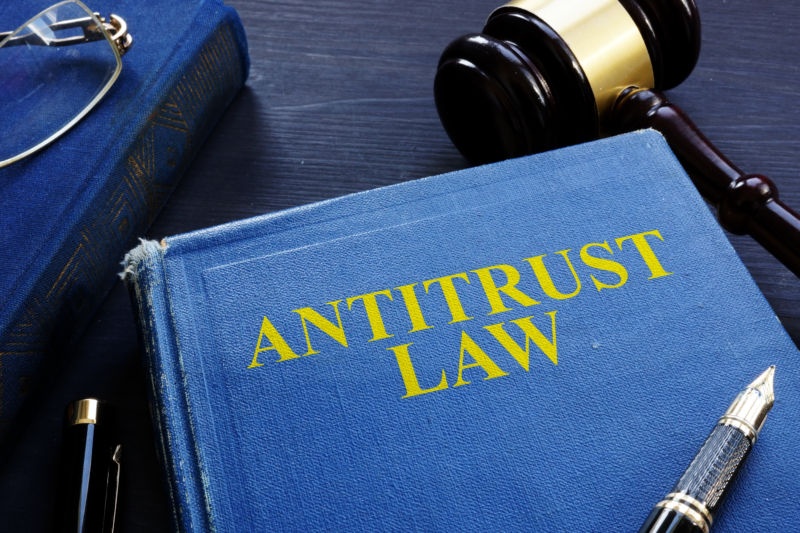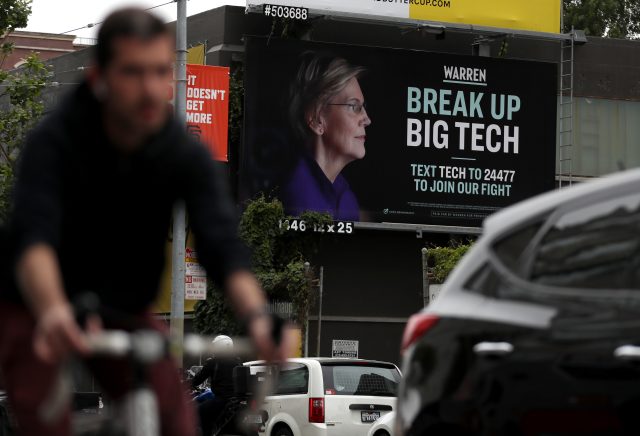
Once upon a time, there was a phone company—or rather, the phone company. AT&T Corp., the venerable "Ma Bell," provided nearly all telephone service to nearly all Americans for decades... until it didn't. The company infamously broke up on New Year's Day in 1984, splitting into the seven "Baby Bells," regional carriers that could compete with other long-distance providers for consumer dollars.
The split wasn't just for funsies. The baby Bells were the ultimate result of a settlement between AT&T and the Justice Department, the culmination of an antitrust case that began nearly a decade earlier. It was the first time the feds broke up a communications company for antitrust reasons—and 35 years later, it retains the dubious distinction of being the last.
The decades of deregulation since the Reagan administration have brought us to a whole new era of massive corporate consolidation and the rise of a new wave of conglomerates in sectors that didn't even exist 40 years ago. The growth at the top in tech has been particularly stratospheric: Amazon, Apple, Facebook, Google, and a handful of others that have risen since the turn of the century now dominate our economy and our communications in a powerful way.
Critics from all sides, however, now consider today's tech titans to be too powerful, and all four companies have in recent years faced several investigations probing a central issue: antitrust law. Dozens of probes are going on right now under the auspices of dozens of state, federal, and international bodies using dozens of state, federal, and international statutes. What all of these antitrust laws have in common at their core, though, is the concept of playing fair—especially when it comes to the biggest player in the room.
Antitrust 101: More than monopolies
The newest antitrust law on the books in the United States dates to the 1970s; the oldest comes from more than a century ago, passed in response to the behavior of the railroad, steel, and oil magnates of the first Gilded Age.
The Sherman Act of 1890 was short and sweet, as far as laws go. It declared contracts, corporate trusts, or conspiracies "in the restraint of trade or commerce" between states or nations to be illegal. The Act also outlawed monopolies: "Every person who shall monopolize, or attempt to monopolize, or combine or conspire with any other person or persons, to monopolize any part of the trade or commerce among the several States, or with foreign nations, shall be deemed guilty of a felony."
Most of the juicy stuff in modern antitrust, however, comes from the 20th century. The Federal Trade Commission Act of 1914 established the FTC, with the explicit mandate not only to protect consumers from "unfair or deceptive" acts, but also to "prevent unfair methods of competition" that affect commerce. Those "unfair methods" were outlined in a companion piece of law: the Clayton Antitrust Act, also signed into law in 1914, which significantly refined and strengthened the Sherman Act.
The Clayton Act expanded the scope of antitrust law to deal not just with monopolies, but specifically with anticompetitive behavior—basically, tactics that unfairly boost a company into a dominant market position or that unfairly keep a dominant company at the top and suppress competitors. At the highest level, these behaviors basically fall into two big buckets.
The first is growth through acquisition: you can't just buy out your primary competitor if the field isn't big enough for other companies to pose real competition. Consider the mobile market, for example: regulators decided the imminent union of Sprint and T-Mobile isn't anticompetitive, because T-Mobile and Sprint are the two smallest of the four major players. Even with one of them taken out, the market still has three national carriers. (And under the agreement with regulators, there will theoretically be a fourth carrier again. Someday.)
But if AT&T and Verizon, the two dominant US mobile carriers by far, ever tried to merge operators, even the current crop of business-friendly regulators would almost certainly bring that proposal to a screeching halt. A deal of that magnitude would create a company so far beyond the reach of any potential competitor that no current player or new business could ever reasonably be expected to stand a chance of catching up.
The second metaphorical bucket holds the whole category of dominance through unfair dealings, which can be done by one company or as an agreement among several. One kind of unlawful anticompetitive behavior you find here is classic price-fixing. Recently, for example, StarKist was ordered to pay a $100 million fine after it and Bumble Bee were both found guilty of conspiring to fix prices in the canned tuna market, which is largely controlled by three companies.
Unfair behavior can also include a whole array of tactics undertaken by a single company, such as price discrimination, predatory pricing, or certain kinds of exclusivity requirements. These are the kinds of behaviors a federal judge found Qualcomm guilty of back in May, when she ruled that the company's business practices "strangled competition" with exclusive deals and patent licensing fees that charged device makers even when their products used a different brand of chip.
In modern analyses, regulators are concerned not necessarily with competition for its own sake, but rather with the negative effects that follow when competition disappears. A market with little-to-no competition tends to see prices go up while the quality of the product and service degrade, affecting not only individual consumers but also suppliers and commercial buyers at every level. A player with an extreme dominant market position can leverage its dominance on suppliers that can affect competition several links up or down the chain.

So who's investigating whom?
Concerns about big tech's anticompetitive behavior have occasionally bubbled up for decades. But building pressure seems to have exploded coming into this year, and most major developments in the US seem to have hit just within the past six months:
- March 8: Sen. Elizabeth Warren (D-MA) announces a proposal to break up Amazon, Facebook, and Google as one of the policy planks of her 2020 presidential run. (And within a week, she defended the proposal in front of ample tech sector employees at SXSW 2019. "My view is break those things apart, and we'll have a more robust market in America.")
- May 9: Facebook co-founder Chris Hughes pens a lengthy op-ed in the New York Times making the case for breaking up Facebook sooner rather than later.
- June 3: The House Antitrust Subcommittee announces a bipartisan investigation into competition and "abusive conduct" in the tech sector.
- June 3: Reuters, The Wall Street Journal, and other media outlets report that the FTC and DOJ have settled on a divide-and-conquer approach to antitrust probes, with the DOJ set to take on Apple and Google, and the FTC investigating Amazon and Facebook.
- July 24: The Department of Justice publicly confirms it has launched an antitrust probe into "market-leading online platforms." The DOJ does not name names, but the list of potential targets is widely understood to include Apple, Amazon, Facebook, and Google.
- July 25: Facebook confirms it is under investigation by the FTC.
- September 6: A coalition of attorneys general for nine states and territories announce a joint antitrust probe into Facebook.
- September 6: Google publicly confirms it is the target of a DOJ antitrust probe.
- September 9: A coalition of attorneys general for 50 states and territories announce a joint antitrust probe into Google.
- September 13: House Antitrust Subcommittee sends an absolutely massive request for information to Apple, Amazon, Facebook, and Google, requesting 10 years' worth of detailed records relating to competition, acquisitions, and other matters relevant to the investigation.
- September 25: Media reports indicate the DOJ is also probing Facebook.
- October 22: An additional 38 attorneys general sign on to the states' probe of Facebook, bringing the total to 47.
Although all four of Apple, Amazon, Facebook, and Google are US companies, they operate worldwide, and scrutiny of them is by no means limited to US regulators. Governments and regulatory agencies worldwide, especially in the European Union and its member states, also have several open investigations of all four companies in progress.
reader comments
189